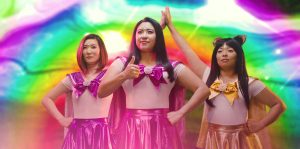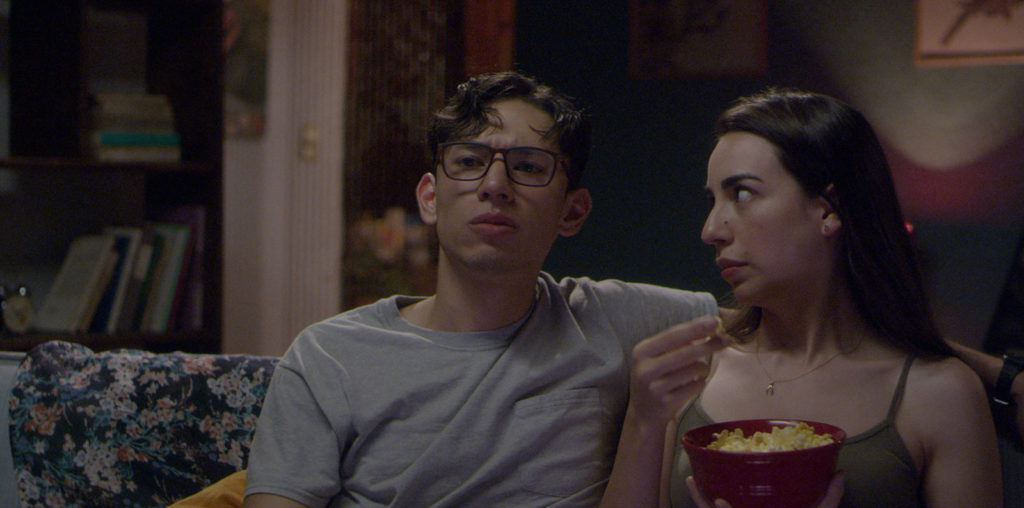
Japanese animation, commonly referred to as anime, is a force unto itself. There are entire conventions dedicated to anime and its ilk, such as manga (Japanese comic books). There is even a word that means “someone who is obsessed with anime,” otaku. Because it’s a style, not a genre, it covers a wide range from sci-fi to dramas to romantic comedies to action-adventure to fantasy and everything in-between. However, there is one genre that seems to be the exclusive domain of anime- the magical girl series!
Mahotsukai Sally, running from 1966-68, and Himitsu no Akko-chan, airing from 1969-70, but whose manga began in 1962, are the two animes credited with bringing the magical girl trope to the Japanese pop culture consciousness. As the various series grew in popularity, the show Majokko Meg-chan aired in 1974. This was the first show of its kind to be marketed to girls and boys. It also established a lot of the iconography, story beats, and character archetypes that would define most modern incarnations of the magical girl, including a foil for the lead that isn’t the main antagonist, the tomboyish nature of such heroines, the h***y older character (usually a mentor or trusted family member, typically portrayed for comedic purposes rather than creepy effect), and the klutzy ways of the non-transformed hero.
These early shows had the girls typically be witches or princesses. It wasn’t until 1992’s release of Sailor Moon that the concept of warriors would be fully introduced to this popular subgenre. The original incarnation of the show encompasses 200 episodes and a reboot/ sequel series beginning in 2014 is still on the air. Due to a mix of impressive animation, a fantastic score, engaging characterizations, and sprawling mythology, Sailor Moon was a success not just in its native land, but also across the globe in countries such as Spain, France, Brazil, Sweden, and, of course, the USA.

“…the three friends then magically transform into their superhero forms to fight the creature made entirely of tampons…”
Even after it went off the air, five years after it first aired, it never sat idle in fan conversations. Partially this is due to the numerous shows it so clearly influenced, such as the lush, painterly Pretear, or the epic insanity of Magic Knight Rayearth. This is also due to the way it shaped the popular culture landscape. Those tropes and iconography have influenced content creators of all color and creed, including director Brian Lonano and screenwriter Victoria Cook.
They’ve co-written the live-action short BFF Girls which is neck deep in the Magical Girl motifs. Rose (Allison Maier) asks her two best friends, Violet (Sydney Allison Thomas) and Lily (Jessica Shipp) if “…they ever bleed down there?”, referring to her first period. The two friends giggle and answer no, when Rose’s h***y, magical cat Neko Sensei (Laurence R. Harvey) shows up to explain menstruation. Meanwhile, on a different planet, their arch-nemesis Fabuloso Doom (Lawrence Sykkmon) watches and asks his evil magic mirror (Dana Synder) for an item imbued with dark magic to use against the superpowered trio.
The mirror produces a tampon from which a ghostly visage will come out and drain all the blood from the victim’s body. Doom plans to drink all the period blood in order to stay youthful forever. The mirror is disgusted by this thought but can’t change the crazy villain’s mind. As the girls are on a walk in the park, they see a lady profusely bleeding from between her legs. They notice a Tampon Cart that is drawing all the women in the vicinity to it. This includes Rose, but her friends are able to break the spell over her. They deduce it must be Fabuloso Doom, who takes off his rather weak disguise and summons Anti-Flow. The three friends then magically transform into their superhero forms to fight the creature made entirely of tampons. Will they be strong enough to defeat it? Can Rose focus on the fight and the changes she is going through? Why is Neko Sensei so h***y?
Lonano and Cook have a lot of fun with the ideas on display here, especially when the girls morph into the heroes. Rose and Lily are Caucasian, and Violet is African-American, but when they transform they all become Japanese women. These women are not the same height or build as their counterpoints, and they now speak Japanese (complete with subtitles). It is freaking hilarious! Marilyn Chung is the super form of Rose, Lily is now Jessica Nam, and Carolann Utley is Violet. But they are the live actors, as they are dubbed over, in an intentionally bad way, by Yuuri Miki, Kyon, and Asuka Ando, respectively.

“…doesn’t believe in the line; rather it pole vaults over all manner of taste and decorum…”
There is also fun with Fabuloso Doom’s evil scheme. Whenever he tells anyone of his plan to drink the blood, no matter who it is, they are visibly repulsed. The puppetry on Neko Sensei is a bit stiff but thanks to creative design work and strong, funny writing that is a minor issue. The sense of style here, from the costumes to the production design, is distinct in giving BFF Girls an animated look. The lively direction keeps things moving, and the action scene is tons of fun.
The movie is certainly an acquired taste, though. It doesn’t believe in the line; rather it pole vaults over all manner of taste and decorum. Imagine if Troma ever made an anime and you’ll be in the right ballpark. Neko Sensei often licks his dick, and the joke of Doom’s plan is in how dementedly grotesque it truly is. If you enjoy The Toxic Avenger or Bad Taste, then you can handle and like this one. If those sorts of movies aren’t your cup of tea, then there isn’t much here that will convert you.
BFF Girls looks and feels like an anime, though it happens to be live action. The acting gets the off-the-wall tone pitch perfect, reinforced by the stellar art, costume, and production design. The directing is sleek and the writing quite humorous, so long as you know the genre it is parodying.

BFF Girls (2018) Directed by Brian Lonano. Written by Brian Lonano, Victoria Cook. Starring Dana Snyder, Laurence R. Harvey, Allison Maier, Sydney Allison Thomas, Jessica Shipp, and Lawrence Sykkmon.
Grade: A-


